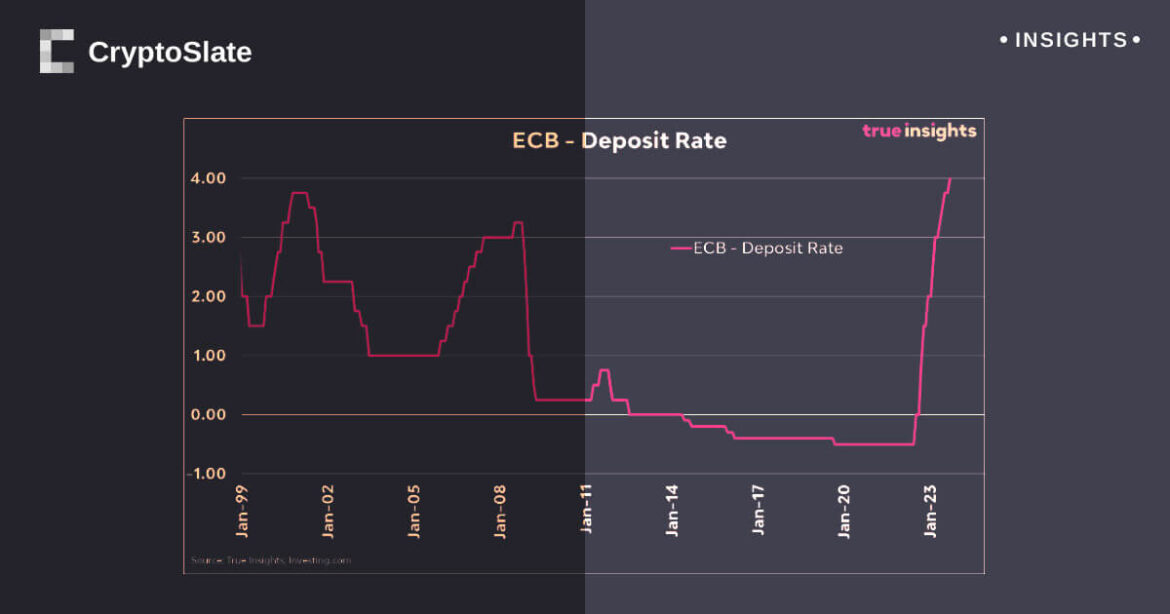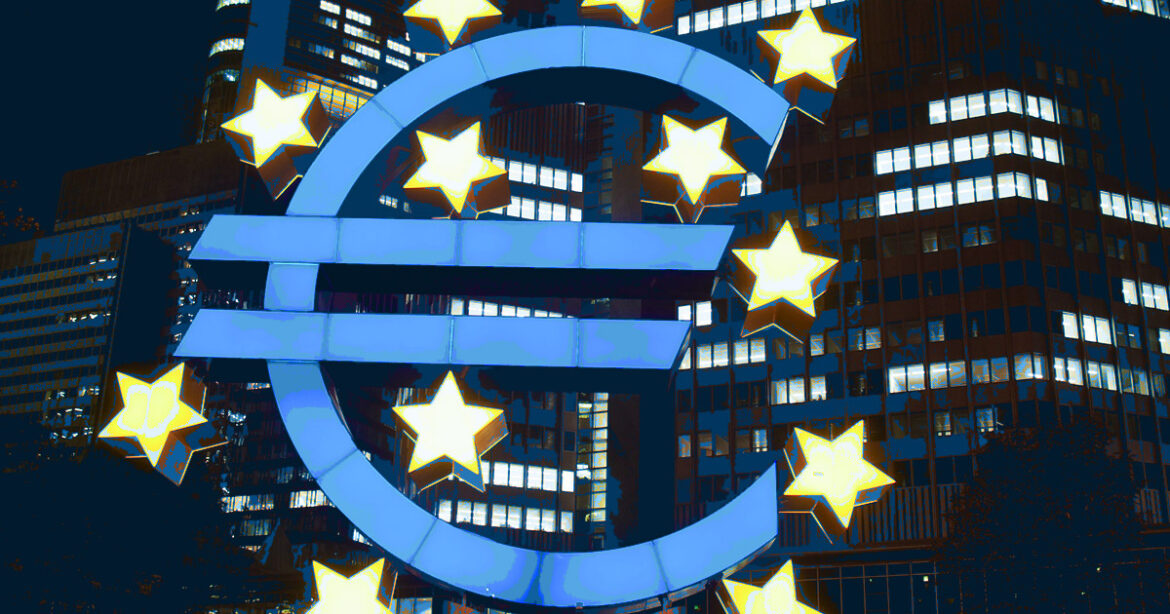 The European Central Bank (ECB) has published a blog post claiming that “bitcoin has failed to fulfill its original promise to become a global decentralized digital currency.” The ECB economists who authored the post added that bitcoin’s fair value is still zero and bitcoin transactions are “still inconvenient, slow, and costly.” Moreover, they asserted that […]
The European Central Bank (ECB) has published a blog post claiming that “bitcoin has failed to fulfill its original promise to become a global decentralized digital currency.” The ECB economists who authored the post added that bitcoin’s fair value is still zero and bitcoin transactions are “still inconvenient, slow, and costly.” Moreover, they asserted that […]
Source link
ECB

In a recent meeting with the European Parliament’s Committee on Economic and Monetary Affairs, Piero Cipollone, a member of the ECB Executive Board, discussed the forthcoming digital euro, specifically its privacy features, infrastructure procurement, and operational standards.
Cipollone’s presentation emphasized the ECB’s proactive approach to collaborating with EU-based entities for the digital currency’s infrastructure. He added that all these entities are registered within the EU and controlled by an EU national.
Privacy concerns
Privacy considerations were a key focus of Cipollone’s remarks. He assured the Parliament that the digital euro would feature superior privacy protections compared to existing commercial payment solutions and include anonymous offline payment transactions.
The ECB executive detailed the planned privacy features of the digital euro, stating that it would collect only a minimal set of pseudonymized data necessary for operations such as settlement. This approach is intended to enhance online payment privacy, addressing public concerns over data protection in digital transactions.
For online transactions, the ECB would access only a necessary, pseudonymized data set for operational purposes like settlement, promising users greater data control than current private payment systems offer.
Moreover, according to Cipollone, the digital euro is designed with top-tier cybersecurity measures to safeguard user data and transactions.
Cipollone said the digital euro has been designed to mirror the accessibility and reliability of cash, thereby reducing reliance on global payment processors and ensuring uniform service across the eurozone. He added:
“Cash and a digital euro have the same objective: ensuring that everyone, regardless of their income, can pay in any situation of daily life. This is a fundamental right. And it should be protected in the same way in all parts of the euro area.”
He likened the digital euro’s infrastructure to public railways, suggesting it would be state-owned yet accessible to various private operators.
Implementation and stability
Cipollone also touched on the importance of a digital euro rulebook to ensure consistent implementation across the eurozone, aiming to reduce dependency on international payment processors by providing a uniform set of rules, standards, and procedures.
Addressing financial stability, the ECB executive outlined measures to prevent the digital euro from competing with traditional savings accounts, including interest-free holdings and restrictions on the digital euro’s accumulation by corporations and financial institutions.
He also mentioned plans to facilitate seamless transactions by linking CBDC wallets with bank accounts, circumventing the need for wallet pre-funding.
The dialogue between the ECB and the European Parliament is part of the preparatory phase for the digital euro, with the ECB providing technical input to co-legislators. The ECB’s efforts aim to prepare for a potential digital euro launch within a framework that prioritizes privacy, operational readiness, and financial stability.
ECB rate hike catapults EUR/USD into sharp decline: a tale of forex sensitivity
Quick Take
The European Central Bank (ECB) has initiated a rate hike of 25 basis points, causing the ECB rates to now stand at 4%. This move, aimed at tightening monetary policy, has had a significant impact on foreign exchange markets, particularly influencing the EUR/USD pair.
The pair experienced a sharp decline, dropping to just below 1.07 post-announcement. This suggests the market’s sensitivity to the ECB’s monetary policy decisions, reflecting the influential role of central banks on currency valuations.
The immediate reaction of the EUR/USD pair underscores the close connection between interest rates and Forex movements. As higher interest rates typically strengthen the local currency, the downturn may indicate investors’ response to the potential economic implications of the rate hike. This action, while seen as a measure to curb inflation, may also reflect the ECB’s confidence in the region’s economic stability.

The post ECB rate hike catapults EUR/USD into sharp decline: a tale of forex sensitivity appeared first on CryptoSlate.
U.S. Federal Reserve chair Jerome Powell along with top central bankers, said further policy rate hikes are on the horizon due to the sustained strength of the labor market in the country.
Powell made the statement on June 28 during the ECB Forum on Central Banking in Portugal. The panel included the Bank of England Governor Andrew Bailey, the Bank of Japan Governor Kazuo Ueda, and ECB President Christine Lagarde.
The central bankers were vocal about the need for further rate hikes to bring inflation down to the 2% target, despite fears of a significant downturn in the economy caused by said hikes.
Lagarde said:
“I think we have to be as persistent as inflation is persistent… We have to be resolute and decided and determined in reaching the target that we have set and not debate the target as we are running that race.
Powell and Bailey echoed the sentiments, saying that the “robust” jobs market called for further tightening to control the extremely high inflation. On the other hand, Ueda said that the growth in the jobs markets does not necessarily call for further hikes for now.
Aggressive hikes likely for U.S.
Powell said the rate hikes could potentially be aggressive if the data shows there is a need for it as the main priority for central banks, including the Fed, is controlling inflation and bringing it down to 2%.
He added that tightening has yet to hit a peak and there is still room for further hikes to ensure inflation is brought down. The Fed chair said:
“The bottom line is that policy hasn’t been restrictive enough for long enough.”
The Fed raised the interest rate consecutive for three straight quarters from March 2022 and only stopped to assess the impact in June.
Markets had been expecting rate hikes to slow down to alternate meetings based on previous comments made by the Fed at the latest FOMC meeting. However, Powell’s latest take on inflation points to consecutive hikes at the upcoming meetings.
He said:
“I wouldn’t take, you know, moving at consecutive meetings off the table.”
Meanwhile, economists believe these rate hikes will have a delayed impact on the economy and their effects have yet to materialize in the form of a steep recession.
The post Central bankers warn of further rate hikes at ECB Forum appeared first on CryptoSlate.
ECB expresses support for European Commission’s digital euro proposal
What is CryptoSlate Alpha?
A web3 membership designed to empower you with cutting-edge insights and knowledge. Learn more ›
Connected to Alpha
Welcome! 👋 You are connected to CryptoSlate Alpha. To manage your wallet connection, click the button below.
Oops…you must lock a minimum of 20,000 ACS
If you don’t have enough, buy ACS on the following exchanges:
Connect via Access Protocol
Access Protocol is a web3 monetization paywall. When users stake ACS, they can access paywalled content. Learn more ›
Disclaimer: By choosing to lock your ACS tokens with CryptoSlate, you accept and recognize that you will be bound by the terms and conditions of your third-party digital wallet provider, as well as any applicable terms and conditions of the Access Foundation. CryptoSlate shall have no responsibility or liability with regard to the provision, access, use, locking, security, integrity, value, or legal status of your ACS Tokens or your digital wallet, including any losses associated with your ACS tokens. It is solely your responsibility to assume the risks associated with locking your ACS tokens with CryptoSlate. For more information, visit our terms page.





